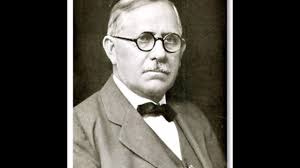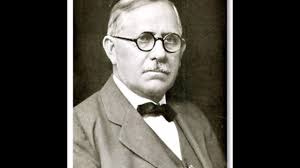Preacher Bio: Reuben 'Bud' Robinson
Despite many hindrances, Bud Robinson preached more than 33,000 sermons and led over 100,000 souls to Christ. His homespun preaching and ability to connect with his listeners still resonate today.
Reuben “Uncle Bud” Robinson never laid claim to greatness. In fact, he gloried in his limitations: He was born in extreme poverty, had few opportunities for formal education, afflicted with epilepsy and other health ailments, and, most unfortunate for a preacher, had a speaking impediment in the form of a lisp. He told his hearers that he had enough shortcomings to “sink a battleship.”
Despite these and other sufferings, he preached more than 33,000 sermons, and led more than 100,000 souls to Christ. He wrote more than 14 books that sold more than 500,000 copies. He traveled more than 2,000,000 miles throughout his life preaching, teaching, and visiting. He personally gave more than $85,000 to help young people get a Christian education that he had never gotten.
Uncle Bud was from the Nazarene denomination, which was part of the larger ‘Holiness movement’ which peaked in the late 19th and early 20th centuries. A core belief of these groups was ‘enire sanctification,’ or a ‘second work of grace’ that occurred after salvation. This experience, they believed, would bring the believer to a point of ‘sinless perfection,’ whererby they would be unable to sin. This was the ultimate state of the Christian faith, in their estimation. (This writer does not subscribe to these beliefs.)
Though these doctrines somewhat hinder his overall message, his strengths overcome his weaknesses. He was known as the Holiness version of Mark Twain, because of his country humor and Southern folk dialect. His personal philosophy is reflected in the prayer he recited every morning:
“O Lord, give me a backbone as big as a saw-log, and ribs like sleepers (floor joists) under the church floor. Put iron shoes on me and galvanized breeches, and hang a wagon-load of determination in the gable end of my soul. And help me to sign the contract to fight the devil as long as I have a vision, and bite him as long as I have a tooth, and then gum him till I die! Amen!”
His manner of speaking drew people in, and made his messages unforgettable. Many hundreds, from all denominations, were drawn to his itenerant meetings. Uncle Bud had a homespun wisdom all his own, with unusual insight into the human experience and how to reach people on a spiritual level.
He was born in 1860 in Tennessee to mountain parents who had no formal learning. The Cumberland area where he was born had farmers and moonshiners; there were few other occupations. But the lack of learning of the people there brought one huge positive. It was a place where storytelling was encouraged. The ability to spin a yarn and entertain family and friends with a story was a prized ability. It was there Bud was first exposed to the craft he would later perfect.
But his home life was most undesirable. His father had fought in the Civil War and returned a drunkard and abusive man. His family cursed, swore, and fought, making his cabin “one of the saddest places in the world.” His father died a pauper and was buried by neighbors. During Bud’s teen years, religion touched his family home as he recalled a profound spiritual experience he had witnessed in his mother. Bud noted that his mother’s conversion made such a deep impression upon him it created within him a deep desire and longing to be a Christian, but his own conversion did not happen until 16 years later.
Meantime, his mother moved Bud and nine siblings to the praries of Texas, where Bud’s life would change forever. When he was around 20 years old, an unanticipated visit from a Methodist circuit rider resulted in Robinson’s conversion to Christ and subsequent call to preach. In his sermons, Bud detailed how he first began to throw away the trappings of his sinful life, saying he had definitely gotten religion, “and it seemed like religion had got me. After shouting until about midnight, I went down to the ravine and threw my revolver away. I kindled a little chunk fire and burnt my deck of cards.”
Bud Robinson was now a Christian. But he still couldn’t read or write. The next two years would constitute his schooling as he learned to read and write by using a New Testament given to him by a Sunday School teacher. He was now ready to take on the world as a preacher of the Gospel. His mother made him a Sunday shirt, and he bought a 25-cent straw hat, a $10 pony, and $2 saddle, and a bridle with rope reins. The picture of a cowboy preacher was now complete.
He would stay true to God for 62 years, preaching the world over. With all the success he enjoyed in his ministry, he had many setbacks and difficulties. He had many health problems that followed him throughout life. One of the great low points was when he was hit by an automobile as he walked on the streets of Atlanta. Witnesses said his body flew 30 feet in the air and came down on the pavement. He spent many weeks in the hospital and the doctors doubted he would ever fully recover. But during this time and many other crises in his life, he never blamed God or felt sorry for himself. He held to the belief that he was in the hand of God. One of his most requested sermons was “My Hospital Experience” drawn from his time recovering from the car accident.
A synopsis of Bud Robinson’s life and ministry can be best summed up from his own words:
Beloved, I thank God that for all of these thirty-seven years as a holiness preacher, though the preaching has been very poor, yet my heavenly Father and the devil know that I have been dead in earnest. I have never rounded off a corner, I have never called it, by any name that I thought the rich, worldly people in the church would accept instead of the real experience, but I have called it entire sanctification; I have called it scriptural holiness; I have called it the second blessing; I have called it the baptism with the Holy Ghost and fire; I have told the people that the old man had to be crucified and that the body of sin had to be destroyed; that there was no such an experience as what as been called suppression; that there was not any such experience as counteraction…
Bud Robinson was truly an unusual man and unusual preacher. His stature and reputation as God’s preacher has only increased in the years following his death.
Illustrations & Stories From Uncle Bud…
ON ELECTION
"You know, beloved, I found that God voted for me . . .
And the devil voted against me . . .
Well, that made a tie vote, and no one gets elected that way . . .
So I voted on Jesus' side and that made a plurality . . .
And bless God, I've been elected ever since.
GETTING THE VICTORY
"Can't you get the victory, little sister?" asked Uncle Bud of a lady who had been praying for a long time at an altar of prayer.
"No, I just can't seem to pray through to where I know everything is all right."
"What seems to be the matter? Have you surrendered everything to the Lord?"
"Yes, everything except my tongue, that is my worse fault. I like to talk too much,"
"Now, look here, little lady. This altar is 32 feet long, and if it's necessary, we can make a splice on one end. You just get your tongue out and put it on the altar and leave everything in the hands of the Lord and He will take you through all right."
Needless to say, she got the victory.
MARTHA ROBINSON
By reading his writings one can easily note there was a feeling of warm companionship between Bud Robinson and his Mother. In the early 1920s he made a trip to "dear ol' Texas" to see her.
Together, they sang, prayed and shouted in happy fellowship. She was well up in years and all knew she would not be long for this world.
Some months later, as she lay on her death bed, and being asked by those present, if she thought it best to send for her preacher boy. She replied, "No, children, don't you know Buddie is in a meeting and if he leaves it to watch me go to heaven a dozen souls might be lost."
That night, true to her prediction, as Buddie preached in an Oklahoma campaign a dozen men came to the altar of prayer. Shortly after the service was over, Bud Robinson received word that his mother had been translated.
BUD'S TESTIMONY ON HOLINESS
"Bless the Lord. On the 7th of June, 1890, a tree of perfect love sprang up from the bottom of my soul with sanctification written all over it, grapes and pomegranates on every limb and honey dripping from the leaves. Glory to God. Holiness seed never rots! It will keep for many years in any climate on earth and grow, as well in poor climate as rich.
That is one of the peculiarities of Holiness seed. It will produce an abundant harvest in the poorest soil on earth. "If the drought ruins the corn and the boll worm destroys the cotton, it doesn't affect the crop ofHoliness at all. It grows and flourishes and yields a greater crop than under any other circumstances.
I have seen Holiness seed in the mud just as sound as a dollar and I have seen it in the dust growing and looking as fresh and beautiful as if it had been planted on the banks of a running stream. When the seed gets planted once in a community, there is no way on earth to stop it. It is like Johnson grass-- it just simply takes the country.
This is one of the reasons the enemies of Holiness hate it so bad. There is no chance to kill it out. If they pull up one, a dozen will come up in its place. You see the thing that makes some people awfully mad, makes others shout. The idea of not being able to kill it out nearly tickles me to death.
"Well, Glory!"
END



